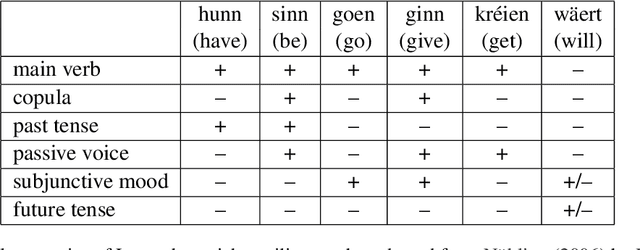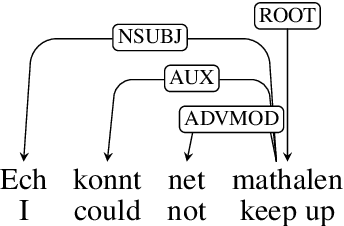Anne-Marie Lutgen
Neural Text Normalization for Luxembourgish using Real-Life Variation Data
Dec 13, 2024



Abstract:Orthographic variation is very common in Luxembourgish texts due to the absence of a fully-fledged standard variety. Additionally, developing NLP tools for Luxembourgish is a difficult task given the lack of annotated and parallel data, which is exacerbated by ongoing standardization. In this paper, we propose the first sequence-to-sequence normalization models using the ByT5 and mT5 architectures with training data obtained from word-level real-life variation data. We perform a fine-grained, linguistically-motivated evaluation to test byte-based, word-based and pipeline-based models for their strengths and weaknesses in text normalization. We show that our sequence model using real-life variation data is an effective approach for tailor-made normalization in Luxembourgish.
LuxBank: The First Universal Dependency Treebank for Luxembourgish
Nov 07, 2024



Abstract:The Universal Dependencies (UD) project has significantly expanded linguistic coverage across 161 languages, yet Luxembourgish, a West Germanic language spoken by approximately 400,000 people, has remained absent until now. In this paper, we introduce LuxBank, the first UD Treebank for Luxembourgish, addressing the gap in syntactic annotation and analysis for this `low-research' language. We establish formal guidelines for Luxembourgish language annotation, providing the foundation for the first large-scale quantitative analysis of its syntax. LuxBank serves not only as a resource for linguists and language learners but also as a tool for developing spell checkers and grammar checkers, organising existing text archives and even training large language models. By incorporating Luxembourgish into the UD framework, we aim to enhance the understanding of syntactic variation within West Germanic languages and offer a model for documenting smaller, semi-standardised languages. This work positions Luxembourgish as a valuable resource in the broader linguistic and NLP communities, contributing to the study of languages with limited research and resources.
 Add to Chrome
Add to Chrome Add to Firefox
Add to Firefox Add to Edge
Add to Edge